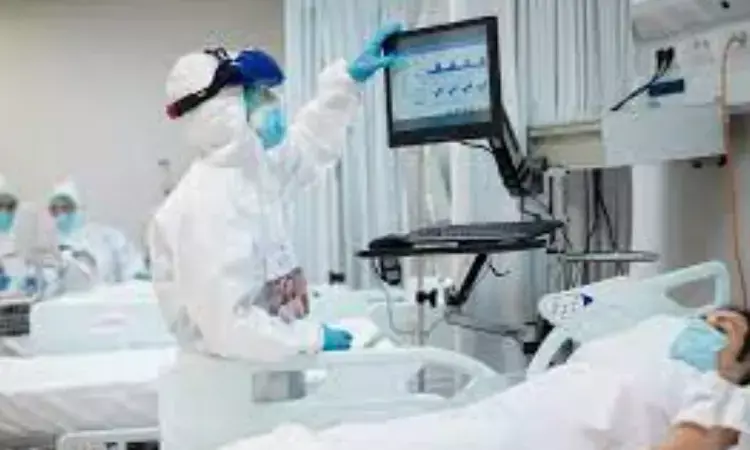- Home
- Medical news & Guidelines
- Anesthesiology
- Cardiology and CTVS
- Critical Care
- Dentistry
- Dermatology
- Diabetes and Endocrinology
- ENT
- Gastroenterology
- Medicine
- Nephrology
- Neurology
- Obstretics-Gynaecology
- Oncology
- Ophthalmology
- Orthopaedics
- Pediatrics-Neonatology
- Psychiatry
- Pulmonology
- Radiology
- Surgery
- Urology
- Laboratory Medicine
- Diet
- Nursing
- Paramedical
- Physiotherapy
- Health news
- Fact Check
- Bone Health Fact Check
- Brain Health Fact Check
- Cancer Related Fact Check
- Child Care Fact Check
- Dental and oral health fact check
- Diabetes and metabolic health fact check
- Diet and Nutrition Fact Check
- Eye and ENT Care Fact Check
- Fitness fact check
- Gut health fact check
- Heart health fact check
- Kidney health fact check
- Medical education fact check
- Men's health fact check
- Respiratory fact check
- Skin and hair care fact check
- Vaccine and Immunization fact check
- Women's health fact check
- AYUSH
- State News
- Andaman and Nicobar Islands
- Andhra Pradesh
- Arunachal Pradesh
- Assam
- Bihar
- Chandigarh
- Chattisgarh
- Dadra and Nagar Haveli
- Daman and Diu
- Delhi
- Goa
- Gujarat
- Haryana
- Himachal Pradesh
- Jammu & Kashmir
- Jharkhand
- Karnataka
- Kerala
- Ladakh
- Lakshadweep
- Madhya Pradesh
- Maharashtra
- Manipur
- Meghalaya
- Mizoram
- Nagaland
- Odisha
- Puducherry
- Punjab
- Rajasthan
- Sikkim
- Tamil Nadu
- Telangana
- Tripura
- Uttar Pradesh
- Uttrakhand
- West Bengal
- Medical Education
- Industry
West Bengal issues new protocol for admission, discharge of COVID-19 patients

Kolkata: A new protocol has been laid down in West Bengal regarding admission and discharge of Covid-19 patients by the experts overseeing the Covid management in the state, noting that covid patients who do not have fever or who do not require oxygen support for three days in a row would be considered as 'fit for discharge'.
The officials conveyed the information to the state-run medical colleges and hospitals on Monday, reports the Telegraph India.
Also Read:Novartis pushes forward with Covid drug after positive trial: Bloomberg
The patients would be checked if they require admission to ICU's on the basis of their oxygen saturation levels. If they respond, they would be treated in a general ward without shifting to an ICU or an HDU, said the officials. The new guidelines were laid down by the experts after interacting with senior doctors and officials of state-run tertiary and secondary healthcare institutions.
Gopal Krishna Dhali, the chairman of the five-member Covid management committee set up by the health department said, "The new protocol specifies which Covid patient will be admitted where — either to an ICU, ITU or a Covid ward and how doctors need to assess the requirement." Dhali added, "If, for instance, a patient's oxygen saturation is below 94 per cent he or she can be subjected to 10 litres of oxygen (supply per minute) in a Covid ward instead of an ICU. He or she may be shifted to a HDU (high dependency unit) if the saturation level doesn't improve. But there is no need to directly admit him or her to an ICU."
According to the officials, the action comes after the health department of the stated observed that a small section of patients reporting mild infection and low oxygen saturation levels were directly shifted to ICUs across state and private healthcare facilities.
While observing the condition of Covid patients in hospital, the officials stated that in most cases, the patients are rarely taken into either HDUs or general wards, adding that due to this serious patients are unable to obtain a slot in the ICU's.
A senior official at Swasthya Bhavan said, "At RG Kar Medical College and Hospital, for instance, moderately critical patients have been admitted to ICUs when they could have been treated in wards, which are equipped with ventilators," adding, "There has been a general tendency to create hype and avoid responsibilities."
The officials also told the hospitals and medical colleges to not to to defer surgeries on the pretext of rising Covid cases.They were asked to to go ahead with emergency operations with due care, as per the report in Telegraph India.
A committee member stated, "Elective surgeries can be deferred but not ones that require immediate intervention." The new guidelines has stressed on the intensive monitoring of high-risk patients at hospitals including senior citizens with co-morbidities and those undergoing chemotherapy for cancer.
According to the officials, such patients should be checked four times a day, with any deterioration in their condition needed to be looked into immediately. Dhali added, "Monitoring doesn't mean prescribing costly anti-viral medicines or similar drugs. A keen eye on the parametres and necessary intervention can bring about positive changes."
Also Read:JnJ Single shot vaccine protects against breakthrough COVID-19 for up to 6 months: Study
Revu is currently pursuing her masters from University of Hyderabad. With a background in journalism, she joined Medical Dialogues in 2021.


